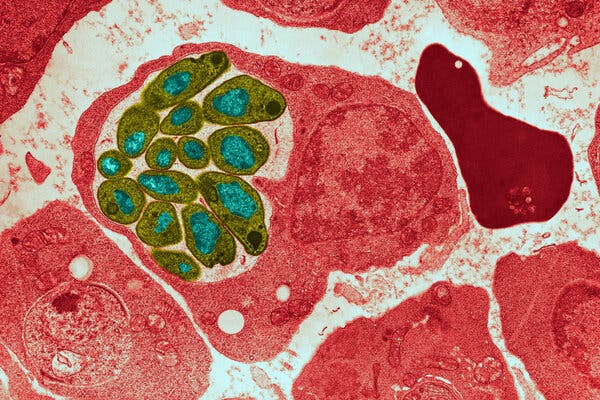Throughout history, diseases have intricately influenced the trajectory of human civilization, and malaria is no exception. This pestilential affliction, which has persistently plagued humanity, raises profound questions concerning our stewardship of the planet and the interconnectedness of health, spirituality, and societal progress. Within the Baha’i teachings, one can glean profound insights into the intersections of disease, environment, and development—especially when confronting the continuing threat posed by malaria.
The Baha’i Faith posits a vision of unity and cooperation among all peoples, underscoring the immense potential of collective action to address global challenges. The eradication of diseases, such as malaria, exemplifies the critical need for collaboration that transcends national borders and cultural barriers. The concept of oneness, a fundamental tenet of Baha’i belief, challenges individuals to recognize their shared human condition and the ramifications of malady, which does not discriminate based on ethnicity, socioeconomic status, or geographical location.
First, consider the spiritual implications of disease. Malaria, predominantly a disease affecting tropical regions, is more than merely a public health crisis; it serves as a reflection of a greater malaise within society itself. Baha’i writings suggest that all afflictions, whether they be physical, social, or spiritual, are inextricably linked to the human experience and that each ailment calls for a response not only of diagnosis and treatment but also of introspective inquiry. What mechanisms contribute to the prevalence of malaria? How does the socio-economic landscape facilitate or hinder health outcomes? Baha’is are encouraged to reflect upon these questions in the light of divine guidance.
The Baha’i emphasis on education and knowledge comes into sharp focus when addressing malaria. Ignorance is explicitly identified as a formidable barrier to health advancement. The Baha’i teachings advocate for universal education, positing that informed communities are better equipped to implement strategies for the mitigation of diseases. By fostering a culture of inquiry and understanding, the Baha’i community empowers individuals to engage actively in the fight against malaria—be it through public health education, hygiene promotion, or empowerment-focused initiatives. This approach aligns seamlessly with contemporary public health strategies that underscore the importance of knowledge dissemination and community engagement in combating malaria.
Moreover, the Baha’i perspective on the environment highlights the crucial interplay between ecological health and the proliferation of diseases such as malaria. Environmental degradation, often resulting from the actions of humankind, can exacerbate conditions that favor the breeding of malaria-carrying mosquitoes. The teachings advocate for balance and preservation of the environment as an ethical obligation, urging stewardship of creation that respects the intricate web of life. A healthy ecosystem is posited as foundational for the overall health of communities, suggesting that efforts to combat malaria must also entail active environmental preservation and sustainable practices. Indeed, the prevention of malaria necessitates a holistic view that encompasses not only the immediate human health concerns but also the broader ecological context.
As humanity advances towards the millennium—a time envisioned by Baha’is as a significant turning point in human development—the expectations for global health equity become paramount. The eradication of malaria is not only a public health goal but also a litmus test for our collective commitment to justice, equity, and compassion. Baha’i teachings emphasize that the spiritual and moral capacities of humanity must be elevated in order to achieve such global aspirations. By nurturing virtues such as compassion, trustworthiness, and cooperation, individuals can become catalysts for change in their communities, facilitating collaborative efforts to combat malaria.
A noteworthy aspect of the Baha’i Faith is its call for scientific inquiry. Knowledge is highly revered within Baha’i teachings, where science and religion are seen as complementary forces. The Baha’i model encourages a scientific approach to understanding malaria’s etiology, coupled with a reverence for the spiritual implications of health. This dual focus embraces advancements in medical research while simultaneously fostering a philosophical dialogue about the human condition, purpose, and ultimate destiny.
The application of technology in combating malaria presents another avenue ripe for innovation and cooperation. Baha’i teachings encourage the utilization of resources for the betterment of society. Access to modern technology, such as insecticide-treated nets, rapid diagnostic tests, and antimalarial medications, must be equitably disseminated to combat the scourge effectively. The role of technology transcends pure innovation and enters the realm of ethical distribution, embodying the Baha’i principle of collective well-being.
As we navigate the complexities of the present day, a Baha’i perspective on malaria invites us to rethink our approach to health crises. The teachings elaborate upon the necessity for both spiritual and practical responses to such diseases. In a world aching for healing, the Baha’i commitment to unity, education, and environmental stewardship emerges as a beacon of hope. Our efforts to combat malaria should be inherently linked to our broader responsibilities as stewards of creation and agents of justice.
The resolution of malaria, then, is not just the elimination of a disease; it is an invitation to elevate our understanding of what it means to be part of a global society. It challenges us to engage with profound questions about our interconnectedness, our shared responsibilities, and our collective potential to create a future where health and wholeness abound. In this journey toward the millennium, the Baha’i teachings serve as a compelling framework, prompting a transformative shift in perspective and insight, which in turn incites curiosity and exploration toward holistic health solutions. By recognizing the multifaceted nature of malaria as a personal and communal challenge, humanity can faithfully pursue the promises of a healthier, more equitable world.
